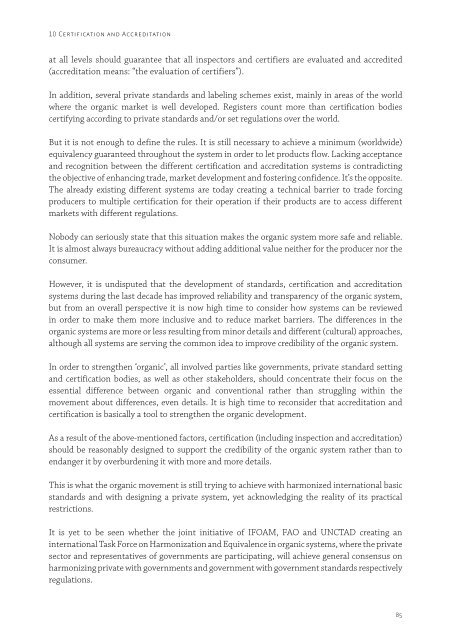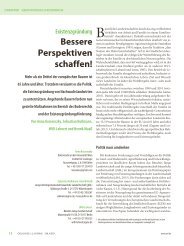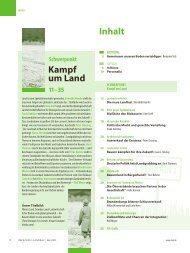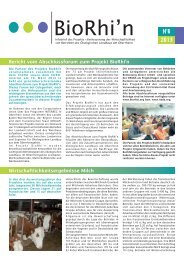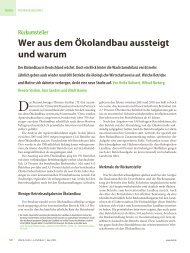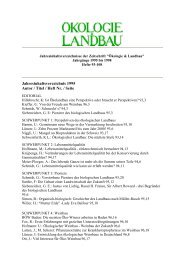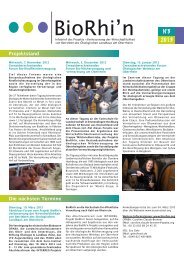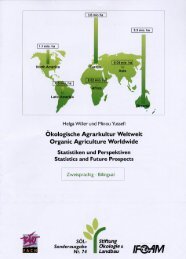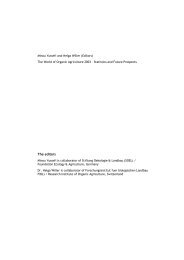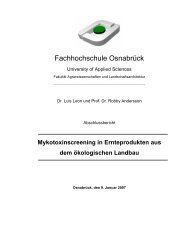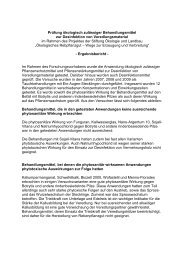the world of organic agriculture - Organic Eprints
the world of organic agriculture - Organic Eprints
the world of organic agriculture - Organic Eprints
You also want an ePaper? Increase the reach of your titles
YUMPU automatically turns print PDFs into web optimized ePapers that Google loves.
10 Certification and Accreditation<br />
at all levels should guarantee that all inspectors and certifiers are evaluated and accredited<br />
(accreditation means: “<strong>the</strong> evaluation <strong>of</strong> certifiers”).<br />
In addition, several private standards and labeling schemes exist, mainly in areas <strong>of</strong> <strong>the</strong> <strong>world</strong><br />
where <strong>the</strong> <strong>organic</strong> market is well developed. Registers count more than certification bodies<br />
certifying according to private standards and/or set regulations over <strong>the</strong> <strong>world</strong>.<br />
But it is not enough to define <strong>the</strong> rules. It is still necessary to achieve a minimum (<strong>world</strong>wide)<br />
equivalency guaranteed throughout <strong>the</strong> system in order to let products flow. Lacking acceptance<br />
and recognition between <strong>the</strong> different certification and accreditation systems is contradicting<br />
<strong>the</strong> objective <strong>of</strong> enhancing trade, market development and fostering confidence. It’s <strong>the</strong> opposite.<br />
The already existing different systems are today creating a technical barrier to trade forcing<br />
producers to multiple certification for <strong>the</strong>ir operation if <strong>the</strong>ir products are to access different<br />
markets with different regulations.<br />
Nobody can seriously state that this situation makes <strong>the</strong> <strong>organic</strong> system more safe and reliable.<br />
It is almost always bureaucracy without adding additional value nei<strong>the</strong>r for <strong>the</strong> producer nor <strong>the</strong><br />
consumer.<br />
However, it is undisputed that <strong>the</strong> development <strong>of</strong> standards, certification and accreditation<br />
systems during <strong>the</strong> last decade has improved reliability and transparency <strong>of</strong> <strong>the</strong> <strong>organic</strong> system,<br />
but from an overall perspective it is now high time to consider how systems can be reviewed<br />
in order to make <strong>the</strong>m more inclusive and to reduce market barriers. The differences in <strong>the</strong><br />
<strong>organic</strong> systems are more or less resulting from minor details and different (cultural) approaches,<br />
although all systems are serving <strong>the</strong> common idea to improve credibility <strong>of</strong> <strong>the</strong> <strong>organic</strong> system.<br />
In order to streng<strong>the</strong>n ‘<strong>organic</strong>’, all involved parties like governments, private standard setting<br />
and certification bodies, as well as o<strong>the</strong>r stakeholders, should concentrate <strong>the</strong>ir focus on <strong>the</strong><br />
essential difference between <strong>organic</strong> and conventional ra<strong>the</strong>r than struggling within <strong>the</strong><br />
movement about differences, even details. It is high time to reconsider that accreditation and<br />
certification is basically a tool to streng<strong>the</strong>n <strong>the</strong> <strong>organic</strong> development.<br />
As a result <strong>of</strong> <strong>the</strong> above-mentioned factors, certification (including inspection and accreditation)<br />
should be reasonably designed to support <strong>the</strong> credibility <strong>of</strong> <strong>the</strong> <strong>organic</strong> system ra<strong>the</strong>r than to<br />
endanger it by overburdening it with more and more details.<br />
This is what <strong>the</strong> <strong>organic</strong> movement is still trying to achieve with harmonized international basic<br />
standards and with designing a private system, yet acknowledging <strong>the</strong> reality <strong>of</strong> its practical<br />
restrictions.<br />
It is yet to be seen whe<strong>the</strong>r <strong>the</strong> joint initiative <strong>of</strong> IFOAM, FAO and UNCTAD creating an<br />
international Task Force on Harmonization and Equivalence in <strong>organic</strong> systems, where <strong>the</strong> private<br />
sector and representatives <strong>of</strong> governments are participating, will achieve general consensus on<br />
harmonizing private with governments and government with government standards respectively<br />
regulations.<br />
85


